Related Research Articles
Clarence Eugene "Fuzzy" Haskins was an American singer. He performed with 1950s and 1960s doo-wop group, The Parliaments, and was a founding member of the groundbreaking and influential 1970s funk bands Parliament and Funkadelic, also known as Parliament-Funkadelic. He left Parliament-Funkadelic in 1977 to pursue a solo career. He is a member of the Rock and Roll Hall of Fame, inducted in 1997 with fifteen other members of Parliament-Funkadelic. In 2019, he and Parliament-Funkadelic were given Grammy Lifetime Achievement Awards.

The Music of the Somali people is music following the musical styles, techniques and sounds of the Somali people.

The Macedonian music refers to all forms of music associated with ethnic Macedonians. It shares similarities with the music of neighbouring Balkan countries, yet it remains overall distinctive in its rhythm and sound.
Maryam Mursal is a Somali composer and vocalist.

The Djiboutian Music refers to the musical styles, techniques and sounds of Djibouti. The first major form of modern Djiboutian music began in the mid-1940s, when Djibouti was a part of the French Somaliland. Djiboutian music is characterized by poetry, so that listening to a Djiboutian song is first paying attention to its meaning. The artist rocks the listeners in the cheerfulness of the refrains and the turn of the sentences. Often sung by a couple, a song is played in the form of a sleight of hand between a man and a woman, one recounting his feelings and his love, even his passion for the other, until the other accepts or rejects this offer.

Islamic music may refer to religious music, as performed in Islamic public services or private devotions, or more generally to musical traditions of the Muslim world. The heartland of Islam is the Middle East, North Africa, the Horn of Africa, Balkans, and West Africa, Iran, Central Asia, and South Asia. Due to Islam being a multi-ethnic religion, the musical expression of its adherents is vastly diverse. Indigenous traditions of various part have influenced the musical styles popular among Muslims today. The word "music" in Arabic, the language of Islam, is defined more narrowly than in English or some other languages, and "its concept" was at least originally "reserved for secular art music; separate names and concepts belonged to folk songs and to religious chants".
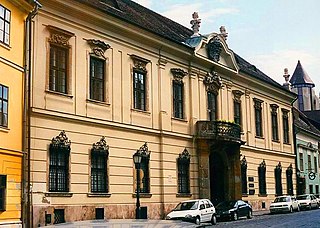
Budapest has long been an important part of the music of Hungary. Its music history has included the composers Franz Liszt, Ernő Dohnányi, Zoltán Kodály and Béla Bartók and the opera composer Ferenc Erkel.

Steve Reich and Musicians, sometimes credited as the Steve Reich Ensemble, is a musical ensemble founded and led by the American composer Steve Reich. The group has premiered and performed many of Reich's works both nationally and internationally. In 1999, Reich received a Grammy Award for "Best Small Ensemble Performance " for the ensemble's performance of Music for 18 Musicians.

The United States Navy Band, based at the Washington Navy Yard in Washington, D.C., has served as the official musical organization of the U.S. Navy since 1925. The U.S. Navy Band serves the ceremonial needs at the seat of U.S. government, performing at presidential inaugurations, state arrival ceremonies, state funerals, state dinners, and other significant events.
Ustad Farida Mahwash ; (1947) is an Afghan singer and voice of Afghanistan. She was the first woman to have been conferred the honorary title of "Ustad" in 1977. She currently lives in Fremont, California, US; and tours the world with her latest all star ensemble Voices of Afghanistan.
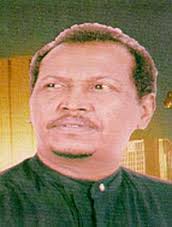
Hasan Adan Samatar is a prominent Somali singer, guitarist and theatrical performer.

Scottish Ensemble is a professional string orchestra based in Glasgow, Scotland and led by Artistic Director and violinist Jonathan Morton.

The United States Air Force Band is a U.S. military band consisting of 184 active-duty members of the United States Air Force.
Ali Abdi Feiruz, known as Ali Feiruz, was a prominent Somali musician. He belonged to the Habr Awal clan of the Isaaq clan family.
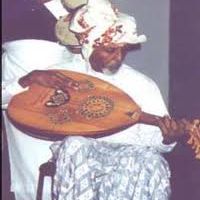
Abdullahi Qarshe (1924–1994) was a Somali musician, poet and playwright known as the "Father of Somali music". In 1957 he wrote and composed the Somali National Anthem, Qolobaa Calankeed.
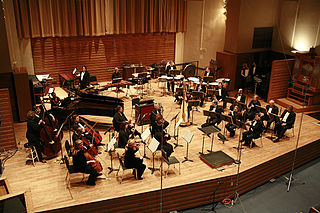
The conductorless orchestra, sometimes referred to as a self-conducted orchestra or unconducted orchestra, is an instrumental ensemble that functions as an orchestra but is not led or directed by a conductor. Most conductorless orchestras are smaller in size, and generally perform chamber orchestra repertoire. Several conductorless orchestras are made up of only strings and focus primarily on string orchestra repertoire. Conductorless orchestras generally come from the classical music tradition and perform standard repertoire, but many conductorless orchestras promote or specialise in contemporary classical music repertoire. Many contemporary classical music ensembles also regularly perform without a conductor.

The University of California Jazz Ensembles, also known as the UC Jazz Ensembles, UC Jazz, or UCJE, is the student jazz organization founded in 1967 on the University of California, Berkeley, campus. Founded in 1967, it comprises one or more big bands, numerous jazz combos, a vocal jazz ensemble, an alumni big band, and instructional classes. With a mission statement to foster a community for the performance, study, and promotion of jazz at U.C. Berkeley, its Wednesday Night big band provides free concerts every Thursday noon on Lower Sproul Plaza, its various units perform throughout the San Francisco Bay Area including area high schools, travel to collegiate jazz festivals, and perform overseas, and for many years it sponsored the annual Pacific Coast Jazz Festival. It also provides master classes by its instructors and clinics by prominent guest artists. It has nurtured numerous musicians who have become professional jazz musicians and educators. UC Jazz Ensembles is one of three groups, with the Cal (marching) Band and UC Choral Ensembles, forming Student Musical Activities (SMA), a department within Cal Performances on the U.C. Berkeley campus. Its members are primarily U.C. Berkeley undergraduate and graduate students, representing many academic disciplines.
The National Theatre of Somalia is located in central Mogadishu, Somalia. It opened in 1967, and served as an important cultural landmark in the national capital. The institution closed down after the start of the civil war in the early 1990s, but was later intermittently renovated by the local authorities. In 2013, the Somali and Chinese governments signed an official cooperation agreement as part of a five-year national recovery plan in Somalia that will see the Chinese authorities reconstruct several major infrastructural landmarks in Mogadishu and elsewhere, including the National Theatre.
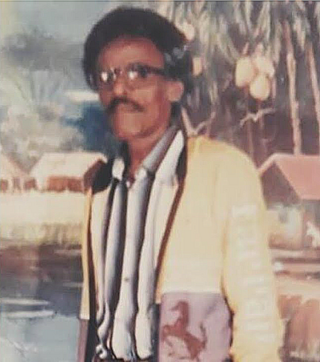
Mohamed Sulayman Tubeec, was a Somali singer, songwriter and record producer. he gained the nickname of " King of Voice."

The Journey is the solo debut album by the Somali musician Maryam Mursal. It was released in 1998 by Real World Records. Mursal supported the album by touring with the Africa Fete festival.